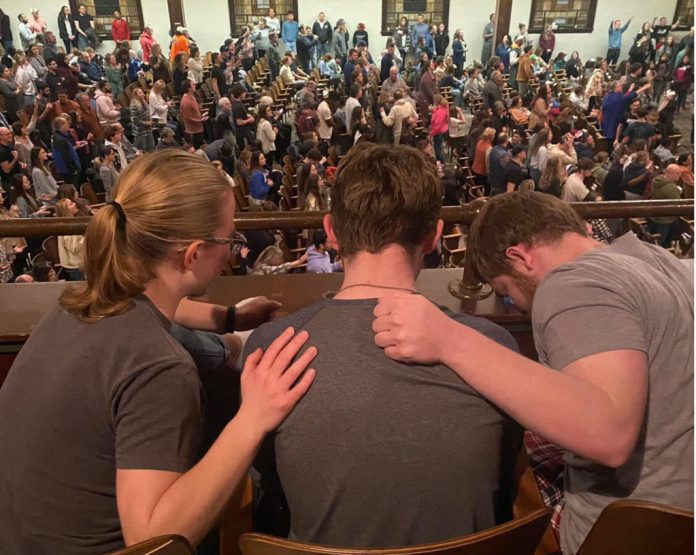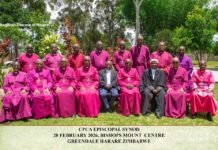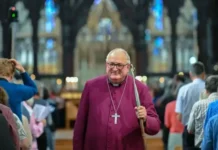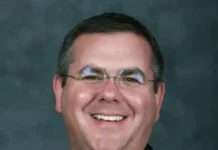Students at Asbury University in Wilmore, Kentucky have been engaged across the past week in what is being described by some participants as an organic, unplanned revival.
I am no revival historian and cannot speak to the historic designation of this event as a revival (university officials have avoided that term, preferring “outpouring of the Holy Spirit” or other descriptors). That important caveat aside, it has been fascinating across the past week to see who has been vocal and who has remained silent amid what is possibly the first major U.S.-based revival of the social media age.
‘Spontaneous Outpouring’
What we know: a February 8 chapel service (viewable online here) concluded with an invitation for students to receive prayer. Dozens stayed, worship leaders continued to play music, and even more returned. One week later, it has yet to conclude. Evenings now see overflow crowds spill onto the steps of the Hughes Auditorium (seating capacity: 1,489) with an up to three hour wait to enter. A smaller 375-seat auditorium has also been filled, as has the 660-seat Estes Chapel at Asbury Theological Seminary (a separate, but collegial institution) across the street, and the Great Commission Fellowship at Wilmore United Methodist Church has hosted an additional overflow site.
For a town of only 6,000 people, that is a significant turnout. People bus in from neighboring colleges and adjacent states.
“It was a simple, regular chapel in which students stayed to pray and engaged in a measure of repentance and brokenness,” Dr. W. Brian Shelton, Chair of the Christian Studies and Philosophy Department at Asbury University, shared in a telephone interview. “The older people in the back offer a great measure of credibility because they have been praying for this. Essentially they offer an affirmation that this is real.”
Shelton tells that “people from all over began coming to Wilmore in order to pray in the auditorium of Asbury. They came to intercede for loved ones, to be healed, to find encouragement in their brokenness. And they just kept coming. I’ve never seen so many people here at Asbury University.”
If you are a regular reader of this blog, you are likely a person formed by, or adjacent to, the Wesleyan tradition in which Asbury is rooted. I’ve heard from friends of the IRD deeply shaped by the legacy of the 1950 and 1970 revivals there. Other friends recall the 1995 revival at Wheaton College sparked by students from Howard Payne University in Texas that spread far beyond the campus of either institution.
“Asbury has a history of experiencing spontaneous outpourings of God’s Holy Spirit,” Former IRD Vice President Jerald Walz, an Asbury University alumnus, explained to me in a phone interview. “I experienced one in 1995, 25 years after the 1970 revival. Much of what I am observing in today’s awakening mirrors what I experienced when I was a student at Asbury in 1995. Then, as now, times of praise, confession, worship, reading scripture, prayer in small groups, were all common.”
Revival in an Age of TikTok?
Local Kentucky media has covered the ongoing chapel services for nearly a week: the Lexington Herald Leader revisited the school’s history of spontaneous revivals. National Christian media took notice, including CBN (which reported revival spreading to Tennessee’s Lee University), Christianity Today and WORLD all offering coverage.
National secular media took notice. Since yesterday, the Washington Post picked up Religion News Service coverage, Fox News and NBC News quickly followed with their own reports. On Wednesday night, Tucker Carlson (an Episcopalian) interviewed Asbury University Student Body President Alison Perfater on his prime time Fox News show.
One can hardly begrudge national media for initially overlooking the revival: it’s hard to identify a good public interest lead from “chapel service ongoing at small Christian college” – especially when there is no apparent connection to a current controversy or broader societal trend. NBC eventually led with a social media angle, noting how TikTok videos hashtagged Asbury Revival “are racking up millions of views.”
Even those who experienced earlier revivals note that the sheer scope of them wasn’t fully visible until well after they concluded. Such timing is at the discretion of the Holy Spirit, and those changed through revival can only seek to be his willing providential agents.
“Revivals happen when people inside the church repent; awakenings happen when people outside the church repent,” commented Dr. Kenneth J. Collins, professor of Historical Theology and Wesley Studies at Asbury Theological Seminary, in an email interview (Collins is a longtime member of IRD’s Board of Directors).
Surprising Silence
Unexpected silence has come from one quarter: conservative religious leaders who regularly call for national revival seem unaware (Historian John Fea of Messiah College has an observant piece at Current documenting that here). To my knowledge, only Tony Perkins of the Family Research Council has weighed in, tweeting that the revival is greatly encouraging and requesting prayer for the students.
There is no political angle here. Participants tell of a deep sense of joy, but the prayer and worship itself is quiet. Those concerned at the prospect of excessive exuberance can themselves calm down.
Revivals begin with conviction in the hearts of those present: personal repentance is an initial spark that catches fire. But among those who have been calling for “a new Great Awakening” the demand is that others change. It’s as though everything else is the problem. Is this the Christian Right equivalent of what we see in politically liberal Mainline Protestant circles, where “repentance” always involves apology for someone else’s transgression?
Repentance demands an acknowledgement that the problem is within me.
“People are coming because they are hungry for God,” Asbury University’s Shelton, and Anglican, describes. “COVID, political and social divisions have wearied our nation. They have prayed from home but they are looking for a greater source of hope, and they have traveled to this space in a way that has surprised us all.”
Shelton was struck by the response of the Asbury community, as well as the greater Wilmore community, to come in service.
“We have employees that normally don’t leave their office as a habit who now are prayer counselors, ushers,” Shelton says. “Wilmore Anglican Church has seen their entire pastoral staff come out to serve, pray, anoint with oil, and to volunteer.”
I’ve not personally experienced what is described as presently taking place at Asbury, but I look forward to it spreading far. God is indeed full of surprises and I will hope to have ears to hear.



